Occupy Central
Occupy Central is a civil disobedience movement which began in Hong Kong on September 28, 2014. It calls on thousands of protesters to block roads and paralyse Hong Kong's financial district if the Beijing and Hong Kong governments do not agree to implement universal suffrage for the chief executive election in 2017 and the Legislative Council elections in 2020 according to "international standards." The movement was initiated by Benny Tai Yiu-ting, an associate professor of law at the University of Hong Kong, in January 2013.
OCCUPY CENTRAL - DAY 35: Full coverage of the day’s events
Calls from business sector grow for Hong Kong's Occupy protests to end
HSBC chief executive says investors are taking a wait-and-see attitude towards Hong Kong
PUBLISHED : Saturday, 01 November, 2014, 4:25am
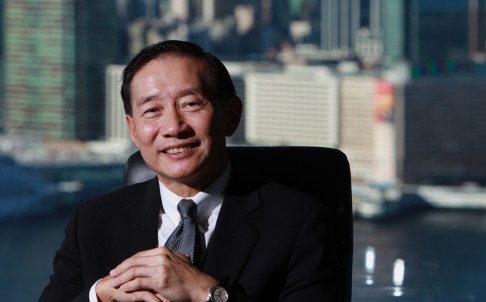
HSBC Asia-Pacific chief executive Peter Wong Tung-shun said investors were taking a "wait-and-see" approach. Photo: Felix Wong
With a highway and other roads still blocked, the five-week-old Occupy movement is harming the city's economic prospects, small and big businesses say.
 HSBC Asia-Pacific chief executive Peter Wong Tung-shun said yesterday investors were taking a "wait-and-see" approach.
HSBC Asia-Pacific chief executive Peter Wong Tung-shun said yesterday investors were taking a "wait-and-see" approach.
He said both the investment and retail banking industries had been affected by the ongoing democracy movement. "Some investors who were originally planning to invest in Hong Kong … would now say they may wait and see first. This kind of attitude will have a severe impact on Hong Kong," Wong said.
"I am now in an embarrassing position, because I am not sure if I can stand tall and say we still have full respect for the rule of law," Wong said.
His concerns were echoed by the president of the Pakistan Chamber of Commerce, Javed Iqbal, who yesterday led a 20-person contingent to police headquarters in Wan Chai to show support for the city authorities. They called for the protest to end.
"The movement can't simply continue for another month or another week … Nothing much has been achieved, besides disturbance and a bad image for Hong Kong," said Iqbal.
G.H. Sagar, president of the Jammu Kashmir Association, said that protesters should trust the chief executive and retreat. "C.Y. Leung is a very nice man," Sagar said. "He can solve your problems."
With commutes long and tangled, hopes of hosting international groups, investors and major events have been dashed. "The type of complaints we receive are basically: when will this end? Is it safe to come here?" Iqbal said.
Jawada Ashraf, who owns two apparel companies, said his business partners had refused to meet him in the city because of the protests. "Usually we have meetings here to discuss prices, check samples and place orders, but last week I had to meet a client in Pakistan." Ashraf said.
Businesses near rally sites have complained that while most regular customers have returned, sales are down.
Sam Lui, who works at Jim's Tailor Workshop in Admiralty Centre, said: "Compared to this time last year, we've probably lost 40 per cent of our business. This has gone on for too long. They're disrupting people's daily lives."
Kwok Mo-ching, owner of City Office Supplies at the same mall, said delivery men avoided the area.
READ MORE: Click here for all the latest Occupy Central stories
"If it's not a driver we know well, then they just won't come because even if they get here on time, the traffic means it takes them a long time to leave the area," she said.
In Mong Kok, the manager of one 7-Eleven store near the heart of the occupied zone says business hasn't changed much and improves on certain days, with more people coming in to buy drinks and snacks.
An employee at Chung Hing Duty-Free Medicine, at the junction of Nathan Road and Argyle Street, said sales had never been worse. "These students are educated and civilised," he said. "They should really stop, as people must make a living."
This article appeared in the South China Morning Post print edition as Calls grow for Occupy to end as business suffers
Another banner day for Occupy supporters as banner hung from Kowloon Peak
PUBLISHED : Saturday, 01 November, 2014, 4:25am
The banner hanging from Kowloon Peak yesterday that reads, "I want real universal suffrage". Photo: SCMP Pictures
First it was Lion Rock. Now Kowloon Peak has been bedecked with a huge banner reading, "I want real universal suffrage".
More than a week after a group of climbers hung the first giant banner from one of the peaks on the ridge behind urban Kowloon, the second appeared yesterday.
While the banner on Lion Rock was removed after a day, its appearance triggered a pennant frenzy among Occupy Central supporters, with smaller ones soon fluttering from university buildings and students sticking miniature ones on their foreheads.
The group of climbers, calling themselves Hong Kong Spidie, released video last week showing them hanging the six metre by 28 metre banner from Lion Rock. No one claimed credit yesterday for the Kowloon Peak banner. Hong Kong Spidie members could not be reached for comment.
In the Legislative Council, meanwhile, lawmakers blocked two attempts to set up special investigations of the Occupy protests and of the tactics police used against some of the protesters.
After almost 14 hours of debate over two days, a motion proposed by Andrew Leung Kwan-yuen to set up a select committee to explore the "large-scale unlawful occupation of roads in a number of districts since September 28" fell foul of the chamber's split-voting mechanism.
Despite receiving 32 votes in favour to 24 against, it was defeated because it failed to secure majority support from both functional constituency lawmakers and those representing geographical constituencies.
"It is inappropriate to conduct an investigation of the students or general public based on their different political backgrounds, otherwise the legislature is acting to suppress opposition views," said Ip Kin-yuen of the education sector, opposing the motion.
Legco select committees have the power to summon witnesses and demand documents.
READ MORE: Click here for all the latest Occupy Central stories
A second motion, proposed by independent Wong Yuk-man, to launch an inquiry into the police handling of attacks on the sit-in in Mong Kok by anti-Occupy protesters on October 3 was voted down by 32 votes to 23.
Secretary for Security Lai Tung-kwok said the government opposed investigating police because it could impinge on criminal investigations.
Up to Monday, 332 people aged 18 to 82 had been arrested for offences relating to the protests, Lai said. They were suspected of crimes including assault, indecent assault, criminal damage, dishonest use of computers, intimidation and attempted arson.
He said the government would cooperate with lawmakers if they sought further information about the arrests in meetings of Legco panels.
As for the future of the protests, Lai told lawmakers that police would take "appropriate measures at an appropriate time" to restore order.
He did not elaborate and would not take any questions from the media.
This article appeared in the South China Morning Post print edition as Another banner day for Occupy protest supporters
High degree of autonomy for city will not undermine China's sovereign power, says professor
Professor says Beijing must realise that change in HK will not impact whole nation
PUBLISHED : Saturday, 01 November, 2014, 4:25am
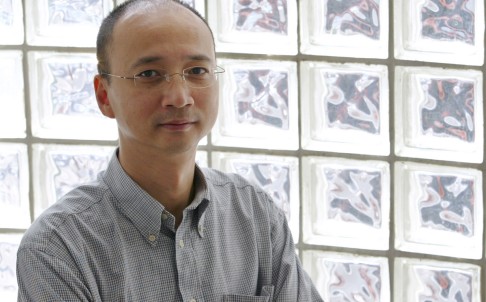
Professor Joseph Chan Cho-wai told a public forum yesterday that the protest had deviated from Occupy Central's original plan.
The political deadlock created by pro-democracy protests could be resolved only if Beijing understood that a high degree of autonomy for Hong Kong would not undermine China's sovereign power, said a Hong Kong University political science professor.
Professor Joseph Chan Cho-wai, associate director of the University of Hong Kong's Centre for Civil Society and Governance, also told a public forum yesterday that the protest had deviated from Occupy Central's original plan. Most participants, he said, might not share the idea of civil disobedience.
Chan coached student protest leaders ahead of their recent dialogue with government officials.
His remarks, at a seminar hosted by HKU's school of humanities, came ahead of a planned meeting tomorrow by sit-in organisers. A major topic of their discussion will be when they might surrender to police, who see the protest as an illegal assembly. Many protesters have no plans to turn themselves in.
Chan raised concerns about the occupiers' indifference towards High Court injunctions demanding that they clear occupied zones. "When a sizeable amount of the community feels that other people do not obey the law, then they might feel that they do not need to obey either," he said.
However, Chan emphasised that the movement was still very peaceful. "Changing the concept of [the] Umbrella Movement to Umbrella Resistance makes perfect sense, as people use the umbrellas to resist pepper spray, tear gas," he said.
READ MORE: Click here for all the latest Occupy Central stories
Chan said they were also resisting the decision by the National People's Congress Standing Committee to impose a restrictive framework for the 2017 chief executive election.
Comparative literature scholar Dr Mirana May Szeto said the movement had completely changed the city's political culture, even if it did not yield immediate results.
"People are no longer happy with democracy as a matter of choice but are looking for a more participatory [model]," she said.
She said that a hierarchical leadership in the social movement would not satisfy the public, which was eager to be involved in decision making.
This article appeared in the South China Morning Post print edition as Autonomy for city 'will not strike at sovereignty'
PUBLISHED : Saturday, 01 November, 2014, 5:14am
UPDATED : Saturday, 01 November, 2014, 10:13am
Why most Hong Kong people are both blue and yellow in the current dispute
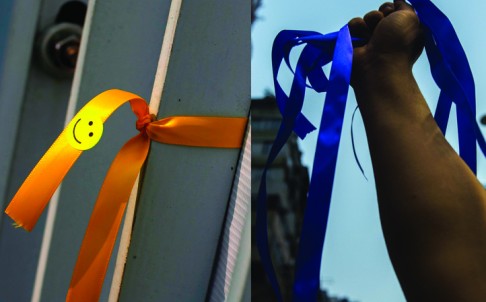
The "real" silent majority is neither blue nor yellow but both.
I thought for a brief moment that Regina Ip Lau Suk-yee was making more than a fashion statement when she donned both blue and yellow at the legislature.
How marvellous it would be for a lawmaker, deep in the ideological trenches over the Occupy protests, to emerge and call for reconciliation between the two camps. Alas, Ip is firmly a "blue" person and was wearing a yellow jacket over a blue dress only because it was chilly that day.
But most Hong Kong people, I believe, are both yellow and blue. Many support the grievances and aims of the student protesters but question the manner in which they are going about it. We want democracy but also the rule of law. We think mass rallies are legitimate means of political expression but blocking major roads and fighting with police are not acceptable.
We recognise the idealism and selflessness of the many student protesters, but are appalled by their dogmatism, over-simplification of deeply rooted problems, unrealistic political demands and sometimes borderline Red Guard tactics.
As a fellow member of a discussion group of mine puts it, many of us are outraged by "a corporatist state run by a plutocratic elite which lacks any real sense of empathy and engagement with the needs of ordinary Hongkongers".
However, as many of us who have lived in mature democracies and experienced their "mixed blessings" know, we can't assume full democracy, however defined, would necessarily ameliorate rather than exacerbate social conflicts and tensions created by our plutocratic capitalist system. The example of the US political system, with its dominance by powerful special interest groups, is enough to give us pause.
READ MORE: Click here for all the latest Occupy Central stories
We may distrust the dictatorial nature of the central government and its one-party state, but we recognise the reality that a chief executive distrusted by Beijing is simply unworkable and that Hong Kong could not prosper without its support.
We acknowledge the British did many things right, mostly out of self-interest, for Hong Kong, but we also recognise that the city is an inalienable part of China.
The "real" silent majority is neither blue nor yellow but both. And it pains us to see the two camps tearing our city apart.
This article appeared in the South China Morning Post print edition as Why most of us are both blue and yellow
PUBLISHED : Saturday, 01 November, 2014, 5:14am
UPDATED : Saturday, 01 November, 2014, 10:13am
Beijing wants tycoons to take action, not just pay lip service
Withdrawn Xinhua report a sign that central government is losing patience with tycoons who it sees as not doing enough to oppose Occupy
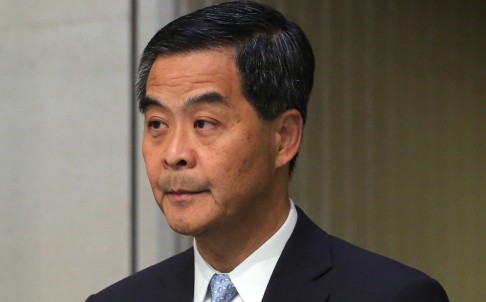
When Beijing has labelled the movement a "battle for sovereignty" and support for Leung as support for the central government, it is demanding action to show full loyalty.
State media don't make "mistakes", so when they say they have made a spectacular one, it's always for a special purpose.
At play is the Xinhua News Agency. At noon last Saturday, it published a signed commentary headlined "Hong Kong tycoons reluctant to take sides amid Occupy turmoil".
The article - which singled out Li Ka-shing of Cheung Kong (Holdings) and three other magnates - was removed at 7pm.
By 10.35pm, Xinhua ran a new story with a completely different tone. "Several Hong Kong business leaders have criticised the month-long Occupy Central movement," its first paragraph read.
It is not hard to imagine the tycoons' shock at the first version.
Their subordinates must have been ringing up their mainland contacts for clues. The answer: it was nothing but a "mistake" made by a junior journalist who was new to Hong Kong.
In the following days, some officials even said the journalist and those involved had been disciplined for making the mistake.
Xinhua is not known as a place where commentators can write what is on their mind
No frequent visitor to China's corridors of power will believe this. After all, Xinhua is not known as a place where commentators can write what is on their mind. It is a government mouthpiece.
Many of them have also heard of the insults levelled at former chief secretary Anson Chan back in September 2000, when Tung Chee-hwa was into his fourth year as chief executive of Hong Kong. While his popularity was nose-diving, Chan was loved. Many mentioned her as a potential rival to Tung in the election to come.
She was summoned to Beijing to meet then vice-premier Qian Qichen and Liao Hui, who was the director of the Hong Kong and Macau Affairs Office.
In one of the meetings, the top man excused himself to take an urgent phone call after some causal exchanges, leaving his subordinates behind with Chan.
To her surprise, one of them got stuck into her for undermining Tung's leadership. For the iron lady of Hong Kong, the wording could not have been stronger.
When the "lecture" was over, the top man returned and picked up his polite conversation with Chan, saying her support for Tung was vital to the success of the administration.
Six months later, she resigned as chief secretary. The year after, Tung won an uncontested election.
How true is this tale? Nobody knows. Yet, to any veteran journalist, this bad cop/good cop play is no news at all.
An editor remembered how he was told off by the secretary of a senior official at the Hong Kong Macau Affairs Office in a closed-door meeting.
The secretary read the criticism from a notebook. His boss stopped him from making the "unfair comments" and told the editor how much he treasured their friendship and looked forward to his professional reporting in the future.
In short, listen to the bad cop. The message: Beijing is impatient with the tycoons.
READ MORE: Click here for all the latest Occupy Central stories
At issue is not what the tycoons have or have not said. In fact, the retracted commentary did mention Li calling on the protesters to go home and not to "let today's passion become tomorrow's regrets".
Yet, it added: "Asia's wealthiest man did not make it clear whether or not he agrees with the appeals of the protesters."
At issue is their failure to take action. It is no secret that many tycoons in Hong Kong campaigned against Leung Chun-ying in the 2012 election. It was not a fight about ideology but who got to eat the cake - the old or the new interest groups.
In spring last year, Beijing managed to bring some in line, best symbolised by media magnate Charles Ho's public retraction of his criticism of Leung.
Others have refrained from making direct attacks on Leung. Yet, hands on hearts, not everyone is on board.
This type of lip service, which may be sufficient when times are "peaceful", is no longer enough.
When Beijing has labelled the movement a "battle for sovereignty" and support for Leung as support for the central government, it is demanding action to show full loyalty.
That demand for more than lip service is perhaps why, even a week after the Xinhua episode, no tycoon has spoken up.
This article appeared in the South China Morning Post print edition as Beijing wants tycoons to take action, not just pay lip service
http://www.scmp.com/topics/occupy-central
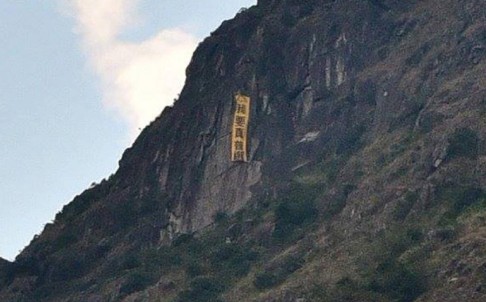



沒有留言:
張貼留言